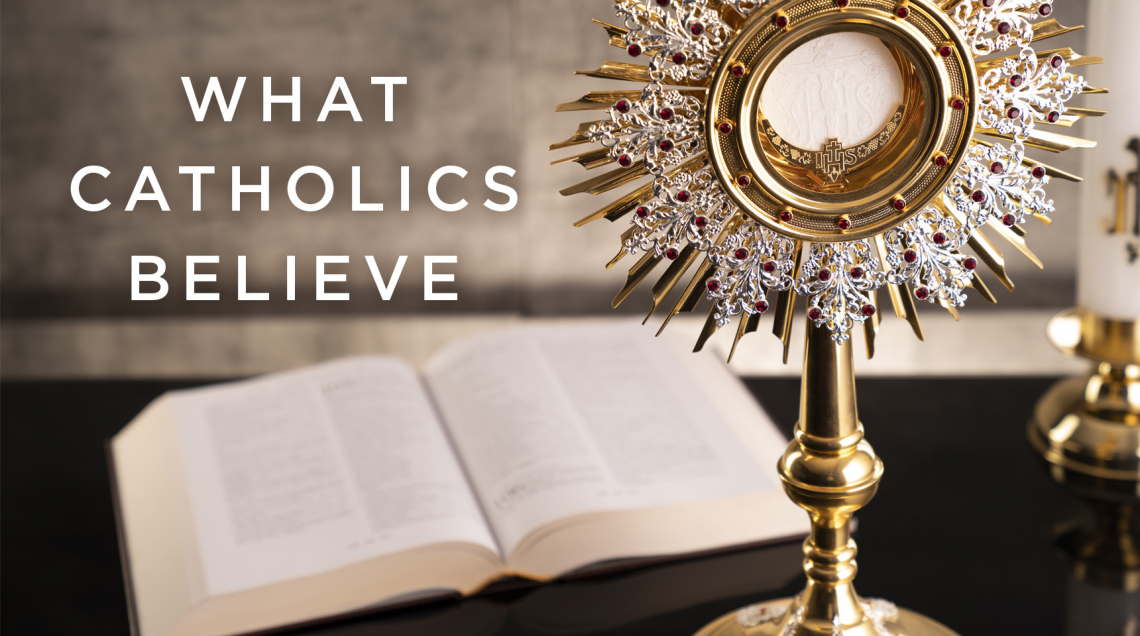The Mass: “To whom am I speaking?”

Whenever you answer the phone, it’s always a good idea to have some indication who might be calling. All of us appreciate knowing the identity of the person to whom we will be speaking. The same is true at Mass. We should try to be conscious, at the various points of Mass, of who is speaking to us and to whom we are speaking. Let me tell you what I mean.
Very often, the priest is speaking to us, for example, when he says, “Let us pray” or “Let us acknowledge our sins.” Sometimes, others present speak to us, as when the person next to us says, “Peace be with you,” or when everyone says with us, “I confess … to you my brothers and sisters.” But we can forget that there are times when God is speaking to us. Whenever the Scriptures are read in the Church, it is God Himself directly speaking to us. So, when the first and second reading are proclaimed on Sunday or when the psalm is sung (even by us!), God is speaking with us. Whenever the Gospel is proclaimed, it is Christ Himself still proclaiming His message. The priest or the deacon lend their voice to God, so to speak, but the living Christ is talking to us. We should listen!
To whom is the priest speaking?
Other than us, to whom is the priest speaking during Mass? Most often, the priest is speaking to God the Father, the first person of the Blessed Trinity. After saying “Let us pray” to us,” the priest offers the opening prayer (collect) for Mass. That prayer is always addressed to God the Father. In fact, almost all the prayers of the Mass are addressed to God the Father. The Eucharistic Prayer itself is addressed to God the Father.
This can get confusing because within the Eucharistic Prayer, the priest quotes the words of Jesus, for example, “Take this all of you and eat of it.” But the priest is not saying those words to us. Although it can look like that because he is facing us, he is actually quoting Jesus’ own words to the Father, reminding God the Father of all that Jesus did and said on the night before He offered his life in sacrifice for us on the altar of the cross.
There are other points during Mass, all of them occurring after the consecration of the bread and wine, when the priest speaks to Jesus. That’s because Jesus has become bodily present under the appearances of bread and wine by that point in the Mass. So, prayers like, “Lord Jesus Christ, you said to your apostles,” or a prayer the priest says silently before receiving Communion, “Lord, Jesus Christ, son of the living God,” are addressed to Jesus, who is before the priest in the eucharistic elements.
To whom are we speaking?
What is true for the priest is also true for us. At times, we speak to the priest and to each other as mentioned above. At other times, we speak to God the Father and to God the Son. For example, during the Gloria, we are speaking to both when we say, “We praise you … O God, almighty Father” and “Lord Jesus Christ … you are seated at the right hand of the Father.” Obviously, the Our Father is addressed to the first person of the Trinity. But many of the words we speak are addressed to Jesus, often without us realizing it. Although the priest is speaking to God the Father during the Eucharistic Prayer, when it comes to the Memorial Acclamation, we are all speaking to Jesus, for example, “We proclaim your death, O Lord.” The prayer Lamb of God is addressed to Jesus, whom John the Baptist pointed out at His baptism. The priest speaks to us when he says, “Behold the Lamb of God,” but we speak to Jesus when we immediately respond, “Lord, I am not worthy to receive you.”
As you can see, there is a great deal going on all through the celebration of Mass. It is a series of dialogues between God and His people, between the priest, acting in the person of Christ and all of us, and among ourselves. There is a great deal to be learned by paying attention to these various dialogues as Mass unfolds. Perhaps during this time of eucharistic revival, you can resolve to try to keep track for yourself of the one or ones to whom you are speaking at any given moment and who is speaking to you. As Jesus said to the Samaritan women, “If you knew who is speaking to you, you would have asked Him for living water.” May the Lord satisfy our thirst to know and love Him more and more.










